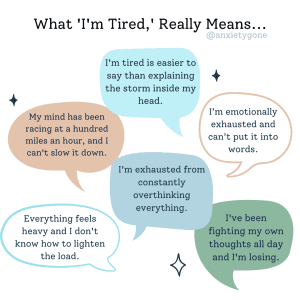Full Disclosure: Clicking on these links could mean a tiny commission for me, at no extra cost to you.
“I’m just tired.” It’s a common phrase we all hear, and perhaps, say more often than we realize. On the surface, it seems straightforward—a simple declaration of physical exhaustion. But when the words are spoken too frequently, they may hint at a deeper struggle hidden beyond daily fatigue. In this article, we take a closer look at what “I’m Just Tired” might really mean in the context of mental health. We explore the silent signals of a mental health struggle when someone says they’re always tired and how to address this concern effectively.
What Does “I’m Just Tired” Really Mean?
The word “tired” can be deceptively simple. For many, it’s a nondescript, safe response to inquiries about well-being — a shield against vulnerability. However, when someone repeatedly says they’re “just tired” , especially when their lifestyle doesn’t account for such physical exhaustion, it warrants a deeper look.
Potential Hidden Meanings in “I’m Tired”
When someone says “I’m just tired,” it can carry a deeper meaning, especially in the context of mental health. This statement might not only refer to physical exhaustion but also to emotional or mental fatigue, which can be signs of underlying mental health issues. Here are some possible interpretations and implications:
- Emotional Exhaustion : This often relates to the cumulative effect of emotional stress from personal, work, or social interactions. It might indicate feelings of being overwhelmed, burnt out, or unable to cope with daily stressors.
- Depression : Chronic tiredness is a common symptom of depression. It might not just be about lack of sleep, but a general loss of energy and motivation that affects all aspects of life, from getting out of bed to maintaining social contacts.
- Anxiety : Constant worry and anxiety can be mentally draining, leaving an individual feeling physically tired. The mental efforts of managing anxiety can deplete energy just as physical activity would.
- Stress Overload : When stress levels are high, either from personal issues or external pressures like work or family, the body’s response can lead to feeling perpetually tired. It’s a way of the body signaling that it needs a break.
- Coping Mechanism: Saying “I’m just tired” might be a socially acceptable way to express that someone is dealing with a lot mentally but isn’t ready to discuss the specifics or doesn’t want to burden others with their troubles.
- Need for Rest : Beyond the mental health implications, it might literally mean a need for physical rest, which is also crucial for mental health. Poor sleep can exacerbate or contribute to mental health issues.
Recognizing the broader context of “I’m just tired” can lead to better support for people struggling with their mental health , encouraging them to address potential mental health concerns and seek appropriate help. It’s important to take such expressions seriously and, when appropriate, offer support or encourage professional help.
Additionally, incorporating cognitive support supplements like Cogniultra or Alpha Brain can aid in enhancing mental clarity and overall well-being.










